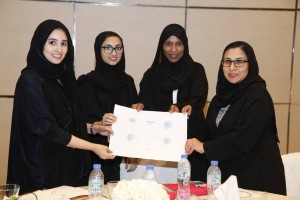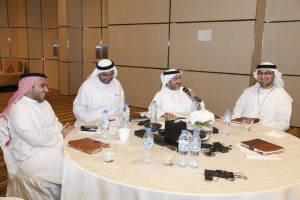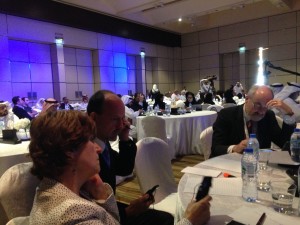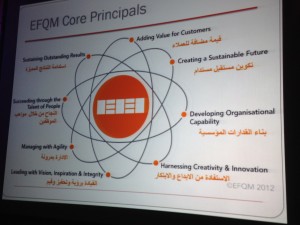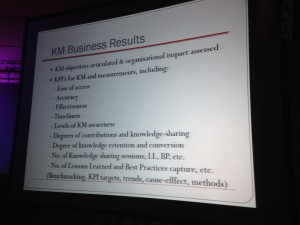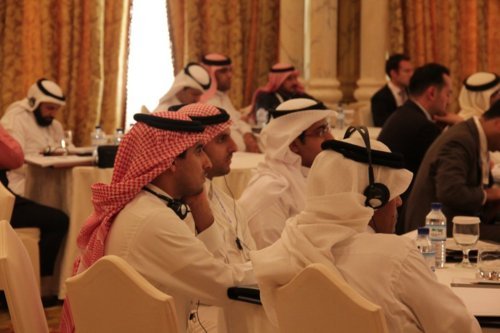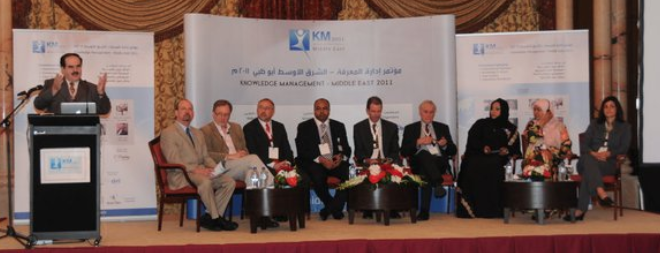It was great to be back in Dubai last month for KM Middle East 2015 where I was running a Masterclass on Day One and giving the Keynote closing address on Day Two.
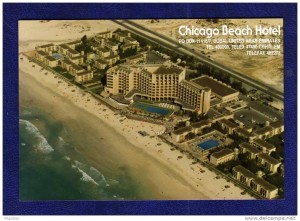 When I went there in 1984 the only hotel in Jumeirah was the Chicago Beach Hotel and that was an isolated spot some 30 minutes drive from Deira on empty roads and across desert. You went there for a bit of R & R after a tour of duty in Saudi Arabia.
When I went there in 1984 the only hotel in Jumeirah was the Chicago Beach Hotel and that was an isolated spot some 30 minutes drive from Deira on empty roads and across desert. You went there for a bit of R & R after a tour of duty in Saudi Arabia.
Today the emirate is home to hundreds of thousands of 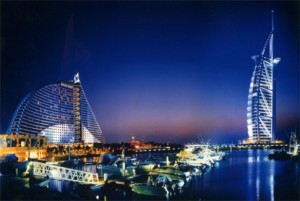 expats and foreign workers all of whom are bringing knowledge to help Dubai develop into one the world’s premier tourist destinations. Here’s how the same piece of coastline looks 30 years on and you can get there today via a metro system!
expats and foreign workers all of whom are bringing knowledge to help Dubai develop into one the world’s premier tourist destinations. Here’s how the same piece of coastline looks 30 years on and you can get there today via a metro system!
Few in 1984 predicted Dubai would grow to be such a diversified economy: limited dependency on oil, increasingly reliant on the knowledge and competencies of its expanding (predominantly foreign) workforce and having the world’s busiest airport.
The underpinnings of such progress are people, process (and of course) technology. The disparity in numbers of indigenous Emirati to Expatriates (who are transient by nature) means that there is greater relience on process and technology to ensure continuity. It is no surprise that the Knowledge Management activity in the region should be more of an operational/tactical nature rather than strategic. This was evident for me at KM Mid East.
The Event – Day One
Held over two days at the very luxurious Park Hyatt Dubai the event comprised a series of workshops on Day One and a Plenary Conference on Day Two. My workshop Unlocking the true value of Knowledge Management: identifying and assessing your organisation’s Knowledge Assets took place in the afternoon from 2pm-6pm.
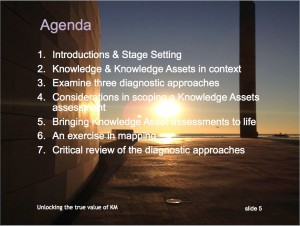 There were 20 people, a nice mix of gender, age and experience. This was the agenda for the afternoon:
There were 20 people, a nice mix of gender, age and experience. This was the agenda for the afternoon:
My aim was to get the participants to think about why KM mattered and to begin to develop an understanding of the Knowledge Assets they had in their business.
I was also keen to look at a few different ways to identify and assess their value and what might they then do to mitigate potential loss.
Session 6 An exercise in mapping was particularly revealing.
Focusing on a recent decision ‘Team A’ used the Event Analyser to describe how they had saved a substantial amount by drawing on the internal knowledge of their organisation which they were then able to pass on for others to use.
It was an enjoyable afternoon (the opening Ice Breaker helped to
lower barriers) and I made sure each session had a mix of informing and doing with plenty of interaction, stories (and humour). And we finished at 6pm with a full contingent!
The Event – Day Two
The slide deck has been made available for each presentation by the organisers and can be found here. There was also a twitter feed #kmme with a few interesting comments thrown in as the day proceeded.
The event was well attended and the presentations informative. Being at the end of the day I had the opportunity to hear everyone. My attention was stimulated by some of the local presentations especially since so many focused on measurement and frameworks.
One which caught my eye which was how Quality Standards such as EFQM are becoming the drivers and measurement yardsticks for KM implementations.
This adherence to standards of excellence fits with the way Dubai and the UAE are measuring progress across a wide spectrum of activities. It was even evident in the surplus food discussions I had while I was there.
People understand that to win environmental and sustainability awards you have to be able to demonstrate effective reuse so the measure is based on sustainability and environmental impact not on the social impact.
Here’s just one of the slides by way of an example of how the framework is being cascaded down in KM.
While entirely logical It poses a number questions for me:
- are the evaluators experenced KM Practitioners?
- the start point would seem to be critical – yes an organisation might make great progress but where is the benchmarking element?
- where do the frameworks cater for increasing the value of an organisation’s Knowledge Assets?
- is there a danger of being in love with the process rather than the results of the process?
It’s a great start though and similar to work done in Singapore where EFQM and ASQ measures have been combined in some organisations as a way of cascading down operating values and standards (SOP’s). Where organisations start to make progress is when competencies are built into the framework.
My Takeaways
So apart from a number of very interesting discussions with the other speakers over dinner and with the delegates at the event what else did I takeaway?
- KM is increasingly being driven by issues of Quality, Standards & Risk. These are operationally focused but provide tangible measures that organisations can point to as a way of demonstrating value. EFQM is the predominent standard in UAE and KM programmes need to align with it.
- Standards organisations are introducing criteria that include being able to demonstrate technical competence in KM including the provision of a KM strategy. If you want the award (and often you need it to sell what you produce) then KM is a must do.*
- Risk (of individual and collective Knowledge loss) in a society that is still essentially transient places great importance on ‘knowing what we know’ and so Knowledge Assets Audting (identifying and assessing) is likely to grow in importance.
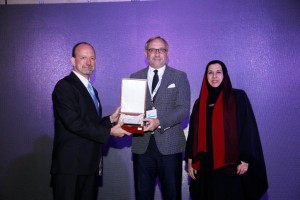 The final takeaway: my speaker ‘award’ (presented by John Girard along with the Deputy Director, Dubai Chambers of Commerce)
The final takeaway: my speaker ‘award’ (presented by John Girard along with the Deputy Director, Dubai Chambers of Commerce)
* as a footnote to this I came across this:
The Standards Institution of Israel (SII), Israel’s member body to the International Organization for Standardization (ISO), has submitted a proposal for a new international standard focusing on requirements for knowledge management systems. As the U.S. member body to ISO, the American National Standards Institute (ANSI) invites all interested stakeholders to submit comments on the proposal by Friday, February 14, 2014.
The proposed International Standard would set down requirements for organizational knowledge management systems, including the creation and maintenance of such systems, the nurturing of a knowledge management culture, measurement of organizations’ knowledge, and approaches to sharing knowledge management solutions. The standard would cover businesses, nonprofits, government organizations, and other groups of any size and in any field.

